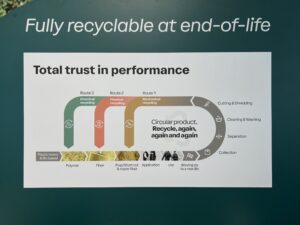Teijin Aramid, a Netherlands-based company, stands as a beacon of innovation and sustainability in the aramid technology sector. As part of Teijin Materials Group, the company has been at the forefront of aramid technology since 1973 as Twaron, later acquired by Teijin in 2000. Rob Woudman, the Global Market Manager for Ballistic Protection, discussed the company’s commitment to sustainability and latest recycling technology advancements in an exclusive interview at Enforce Tac 2024.
Passion for Sustainability
At the core of Teijin Aramid lies a profound passion for sustainability. This is rooted in the DNA of the company and its parent organization, Teijin Limited. Their motto, “Human Chemistry, Human Solutions” embodies a longstanding commitment to societal and environmental well-being. Mr. Rob Woudman exemplifies a profound dedication to making a positive impact on the planet by explaining: “For a while, we’ve said we want to be the best aramid producer in the world, and we deliberately changed that from to . And I think that illustrates we want to contribute to society. We want to do more than just put a box of yarn in your warehouse and make money from it.”.
Carbon Neutrality and Energy Efficiency
Through innovations in energy-saving processes and the adoption of green energy sources, Teijin Aramid significantly reduced their environmental footprint.

Their manufacturing process proves their dedication to sustainability. The spinning process of Twaron yarn, initiated on a commercial scale in the mid-1980s, employs closed-loop systems to minimize waste and maximize resource efficiency by reusing energy and water systems. At the moment, all the electricity used in their factories is green energy.
Teijin Aramid strives for carbon neutrality through the continuous reduction of carbon dioxide equivalents, emitted per kilogram of Twaron produced. In 2008, they emitted 18 kilograms of CO2 per kilogram of Twaron. Between 2012 and 2014, they lowered the value to 12 kilograms. In 2021, in a previous interview with them, they reported 8.7 kilograms. Now, they are approaching 7 kilograms of emitted CO2 per kilogram of Twaron produced. Their goal is to achieve 0.0 emissions by 2050.
Three Types of Recycling and Circular Economy
Teijin Aramid’s sustainability initiatives won the prestigious Ecovadis sustainability gold medal for seven consecutive years. The company’s commitment to a circular economy is also evident in their recycling advancements. They actively engage with partners in the value chain, offering incentives for returning end-of-life materials like old ballistic vests or cutting waste.

In use for 15 years already, Teijin Aramid’s mechanical recycling method entails collecting old vests, separating, and cleaning the material. After that the material is processed back into Twaron pulp. The recycled pulp is adapted to friction applications such as brake pads and clutch facings. Moreover, Teijin Aramid has embarked on a journey of developing a physical recycling process to later implement into their commercial process. Here they process the same materials and reverted them into fiber. After which they spun the newly produced fiber and turn it into Twaron filament yarn. Teijin Aramid thoroughly checks the mechanical properties of the newly produced filament yarn to make the introduced end-of-life materials do not affect it. Still in its incipient phase, the chemical recycling process entails preparing the materials and breaking the polymer chain at monomer level. The substance is then used in their chemical process to produce fresh polymer powder.
Teijin Aramid’s sustainable practices and recycling advancements set a standard for the industry and continue to pave the way towards a more sustainable future in the materials world.









